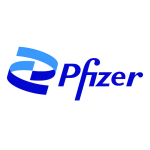Welcome to our dedicated page for Pfizer news (Ticker: PFE), a resource for investors and traders seeking the latest updates and insights on Pfizer stock.
Pfizer Inc. (PFE) is a global biopharmaceutical leader driving innovations in vaccine development and therapeutic treatments. This news hub provides investors and industry professionals with timely updates on corporate developments, regulatory milestones, and market strategies.
Access official press releases, earnings reports, and analysis of Pfizer's clinical trial progress. Our curated collection covers FDA approvals, partnership announcements, and research breakthroughs across oncology, immunology, and infectious disease portfolios.
Key updates include quarterly financial results, manufacturing expansions, and strategic collaborations shaping the pharmaceutical landscape. Bookmark this page for reliable insights into one of healthcare's most influential companies, with content organized for efficient navigation across devices.
Pfizer Inc. (NYSE: PFE) will host a live video webcast on April 9, 2021, at 10 a.m. EDT, featuring updates on its Oncology pipeline, including therapies like LORBRENA® for lung cancer and elranatamab for multiple myeloma. Investors can access the webcast through Pfizer's investor relations website. The session will also include a live Q&A. Pfizer emphasizes its commitment to advancing healthcare and the importance of scientific innovation in developing effective therapies for serious diseases.
Pfizer and BioNTech released updated topline results from their pivotal Phase 3 study on the BNT162b2 COVID-19 vaccine, reporting a 91.3% efficacy rate in preventing symptomatic COVID-19. The vaccine showed 100% effectiveness against severe disease according to the CDC and 95.3% against severe COVID-19 per the FDA. Safety data indicated a favorable profile from over 12,000 participants monitored for at least six months post-vaccination. These results bolster plans for a Biologics License Application to the FDA.
Pfizer (PFE) and BioNTech (BNTX) announced the successful results of a Phase 3 trial for their COVID-19 vaccine BNT162b2, showing 100% efficacy in adolescents aged 12 to 15. The trial, involving 2,260 participants, indicated no COVID-19 cases in the vaccinated group compared to 18 in the placebo group. The companies intend to submit these findings for Emergency Use Authorization (EUA) modification in the US and similar requests globally. They are also advancing studies in younger children, with the goal of public vaccination before the next school year.
Astellas Pharma announced that the European Medicines Agency's Committee for Medicinal Products for Human Use (CHMP) has issued a positive opinion for an additional indication of XTANDI (enzalutamide) for men with metastatic hormone-sensitive prostate cancer (mHSPC). Currently, mHSPC has a median survival of 3-4 years, highlighting the necessity for new treatment options. If approved by the European Commission, XTANDI will be the only oral treatment for three types of advanced prostate cancer. The recommendation is based on the Phase 3 ARCHES trial, showing a 61% reduction in the risk of progression or death.
Astellas Pharma has received a positive opinion from the European Medicines Agency's CHMP for XTANDI (enzalutamide) to treat metastatic hormone-sensitive prostate cancer (mHSPC). This oral therapy addresses a significant unmet medical need, as mHSPC has a median survival of about 3-4 years. If approved by the European Commission, enzalutamide will be the only oral treatment for three types of advanced prostate cancer. The decision is based on favorable results from the Phase 3 ARCHES trial, where enzalutamide plus androgen deprivation therapy significantly reduced the risk of disease progression.
Pfizer (NYSE:PFE) and Eli Lilly (NYSE:LLY) faced a setback as the FDA Joint Advisory Committee voted 1 in favor and 19 against their proposed risk evaluation for tanezumab, an investigational drug for moderate-to-severe osteoarthritis pain. Tanezumab, which is being considered to help patients who have exhausted other therapies, uses a novel mechanism targeting nerve growth factor. Both companies express disappointment but maintain confidence in tanezumab's potential benefits. The advisory vote is non-binding, and discussions will continue as the FDA reviews the ongoing Biologics License Application.
Pfizer Inc. (NYSE:PFE) announced a peer-reviewed study showing that first-line therapy with IBRANCE® (palbociclib) plus letrozole significantly improved real-world progression-free survival (rwPFS) and overall survival (OS) in women with HR+, HER2- metastatic breast cancer compared to letrozole alone. With a median follow-up of approximately two years, median rwPFS was 20.0 months for IBRANCE plus letrozole versus 11.9 months for letrozole alone, demonstrating a 42% reduction in progression risk. The OS rate was 78.3% in the IBRANCE group, indicating a clear benefit of using the combination therapy.
Pfizer Inc. (NYSE: PFE) has advanced to multiple ascending doses in a Phase 1 study of PF-07321332, a novel oral antiviral targeting SARS-CoV-2, after successfully completing single ascending dose testing. The study, conducted in the U.S., assesses safety, tolerability, and pharmacokinetics. This potential first-in-class therapy aims to provide oral treatment for COVID-19, complementing existing vaccines. Preclinical data supports its antiviral efficacy, with further findings to be presented at the Spring American Chemical Society meeting on April 6.
Pfizer invites investors and the public to its conference call on May 4, 2021, at 10 a.m. EDT. This call aims to discuss the First Quarter 2021 Performance Report. Interested participants can join via phone at (833) 711-4984 or (916) 900-3769, using the password 'First Quarter Earnings'. The report and webcast details are available at www.pfizer.com/investors. Pfizer is dedicated to improving global health through innovative medicines and vaccines, demonstrating its commitment for over 170 years.
The Israel Ministry of Health, Pfizer, and BioNTech announced significant findings from a real-world study showing a 97% effectiveness of the Pfizer-BioNTech COVID-19 Vaccine in preventing symptomatic COVID-19, severe cases, and deaths. This data, derived from health surveillance from January to March 2021, showcases the impact of Israel's vaccination efforts, particularly against the B.1.1.7 variant. Further, the vaccine demonstrated 94% effectiveness against asymptomatic infections, emphasizing its role in controlling the pandemic and supporting ongoing immunization campaigns globally.


